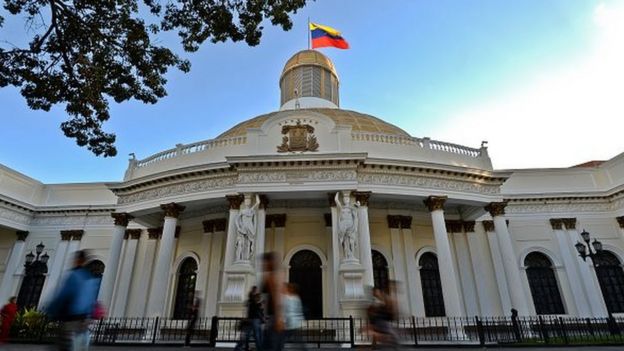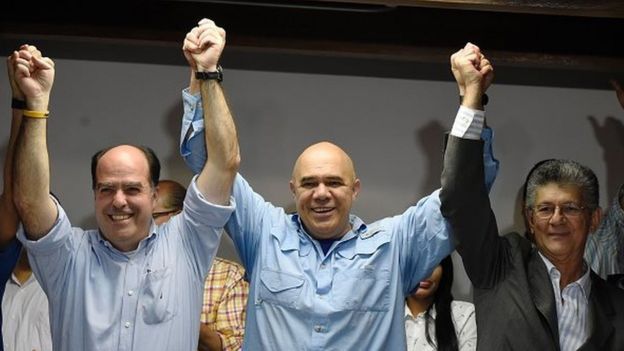
The opposition MUD coalition won 112 seats in the elections on December 06,2014
An opposition coalition won an overwhelming victory in Venezuela's legislative election on 6 December. For the first time in more than 16 years, it will control Congress. The newly elected lawmakers take up their seats on Tuesday January 05,2016
Venezuela has a presidential political system. The president is the head of the executive.
The National Assembly is the legislative branch. It consists of just one chamber with 167 members.
President Nicolas Maduro was elected in April 2013 to a six-year term.
Up until January 05,2016, his party, the socialist PSUV, had a majority in the National Assembly, allowing him to pass laws smoothly and even allowing him to Govern temporarily by Executive Decree
President Maduro will now face a National Assembly in which the opposition MUD coalition is in the majority.
Oposition leader and current National Assembly President, Henry Ramos Allup (R), and Vicepresident Enrique Márquez (L) swear in their seats during the National Assembly Installation, in downtown Caracas, Venezuela, 05 January 2016
For the first time in 17 years, Venezuela’s opposition has taken control over the Congress. The swearing in ceremony was carried out on Tuesday under heavy political confrontation, as it is customary at every major political event in this South American country.

Former Secretary-General of the Democratic Action party Henry Ramos Allup was sworn in as the new Congress president, with Enrique Márquez and Simón Calzadilla as first and second vice-presidents, respectively.
The new president of the Venezuelan parliament, Henry Ramos Allup (C), speaks

As the swearing in was still in process, 54 government legislators, including Maduro’s girlfriend Cilia Flores, stormed out of the National Assembly as a sign of protest
Julio Borges (left), Jesus Torrealba (centre) and Henry Ramos Allup are key figures in the MUD opposition coalition

That gives them a two-thirds majority, also called supermajority.
However, since the election, the Supreme Court has suspended the inauguration of four lawmakers while it investigates allegations of electoral irregularities.
Three of them are members of the MUD opposition coalition, the fourth is a member of President Maduro's PSUV party.
The National Assembly can pass most laws with a simple majority (50% of the lawmakers plus one).
Under Venezuela's constitution, the president only has limited powers to veto laws.
The president can send laws back to the National Assembly, but the latter can override the veto with an absolute majority (half of those present at the time of the vote plus one).
With a three-fifths majority, lawmakers can give the president the power to rule by decree, sack the vice-president and ministers and hire and fire members of the country's National Electoral Council.
With a two-thirds majority, the National Assembly can remove judges from the Supreme Court and create a constituent assembly with a view to rewriting the constitution.

No comments:
Post a Comment